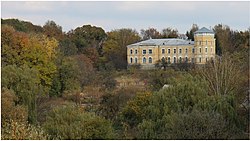Novohrad-Volynskyi
|
Novohrad-Volynskyi Новоград-Волинський |
|||
|---|---|---|---|

Mezentsev Palace in Novohrad-Volynskyi
|
|||
|
|||
| Location of Novohrad-Volynskyi | |||
| Coordinates: 50°35′0″N 27°38′0″E / 50.58333°N 27.63333°ECoordinates: 50°35′0″N 27°38′0″E / 50.58333°N 27.63333°E | |||
| Country |
|
||
| Founded | 9th century | ||
| City status | 1795 | ||
| Government | |||
| • Mayor | Volodymyr Zahryvyi | ||
| Area | |||
| • Total | 26,67 km2 (1,030 sq mi) | ||
| Elevation | 218 m (715 ft) | ||
| Population (2013) | |||
| • Total | 55,991 | ||
| Postal code | 11700—11709 | ||
| Area code(s) | 1811000000 | ||
| Website | http://novograd.osp-ua.info/ | ||
Novohrad-Volynskyi (Ukrainian: Новогра́д-Воли́нський, translit.: Novohrád-Volýns’kyi; Russian: Новоград-Волынский, translit.: Novograd-Volynsky; Yiddish: זוויל translit. Zvil; Polish: Zwiahel) is a city in the Zhytomyr Oblast (province) of northern Ukraine. Originally known as Zvyahel, the city was renamed in 1795 after annexation of territories of Polish-Lithuanian Commonwealth by the Russian Empire soon after the third Partition of Poland.
It serves as the administrative center of Novohrad-Volynskyi Raion (district), though administratively it does not belong to the raion and is incorporated separately as a city of oblast significance. Population: 55,991 (2013 est.)
The city had an important Jewish community. At the start of the 20th century, 10,000 Jews, 50% of the population, lived in the town. In 1919, the Pogroms in Ukraine reached Novohrad-Volynskyi, and the troops of Symon Petliura murdered 1,000 Jews. By the start of World War II only 6,840 Jews remained, (30% of the total population). Hundreds of Jews were murdered in mass executions perpetrated by an Einsatzgruppen in 1941. Many Survivors were imprisoned in harsh conditions in a ghetto and murdered in November 1942, and an important part of the town was destroyed during the war.
...
Wikipedia



